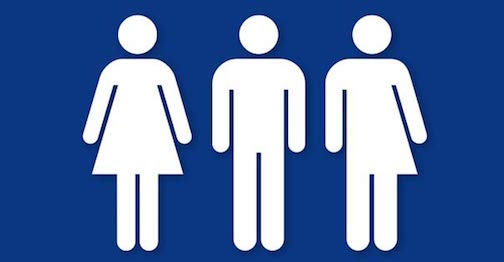In light of a few things that happened of late — the Supreme Court’s ruling on marriage for same-sex couples, the addition of the word cisgender into the Oxford English Dictionary, the rise of the transgender movement, with Germany leading the way for parents to register their baby as something other than just boy or girl, the increase in stay-at home dads and egalitarian marriages, universities recognizing a third gender, the desire by some to be called they versus he or she, the declaration that 2015 is the year of the gender-neutral baby, it’s clear we are moving toward a society that is busting up traditional views of gender and what men and women, husbands and wives, fathers and mothers look and act like.
It’s a postgenderist‘s dream come true.
According to postgenderism — the belief that “men and women should use advanced  biotechnologies to reduce the gender gap and create entirely new opport-unities for sexual expression” — we’d be much freer to explore both our masculine and feminine sides if our bodies and personalities were no longer constrained and limited by gendered traits. It’s clear that gendered expectations make many of us, especially married women, unhappy. We are increasingly seeking equality in all aspects of life, from work to romantic partnerships.
biotechnologies to reduce the gender gap and create entirely new opport-unities for sexual expression” — we’d be much freer to explore both our masculine and feminine sides if our bodies and personalities were no longer constrained and limited by gendered traits. It’s clear that gendered expectations make many of us, especially married women, unhappy. We are increasingly seeking equality in all aspects of life, from work to romantic partnerships.
What if we actually were a gender-neutral society? Would women still earn less than men in the workplace? Would we still expect men to be breadwinners and women caretakers (and as much as we say we don’t want that, we still fall back into gendered roles)? Would work-life issues still be seen as a woman’s issue and not a family issue?
I recently stumbled upon the name of woman I’d never heard of, Shulamith Firestone, a futurist who was instrumental in the 1970s cyberfeminist movement (I didn’t even know there was one). Firestone believed artificial wombs and other reproductive technologies, including gender selection and IVF — both of which are in use today — were a way to free women from the burden of being baby makers. While there’s nothing quite like holding and smelling your baby straight from labor — and I’ve done it twice — in some ways, that makes sense. Pregnancy and childbirth are still incredibly dangerous for women, and not just in developing countries. And let’s not forget the incredible dictates women are under when pregnant — from what they eat and drink and do (including the rise of the personhood movement (shudders) — and the postpartum depression many suffer from. There are also many things than can go wrong for the baby, too, beyond premature birth.
Not only would ectogenesis — the process of growing a fetus outside a human body in an artificial womb — save women and babies from those dangers, but just as assisted reproductive means have allowed the rise in fatherless births and mothers by choice, it would also make it much easier for men — gay, trans, hetero, whatever — to have children without needing a surrogate. As transhumanist presidential candidate (yes, there is one) Zoltan Istvan notes, we are closer to making this a reality than some might think.
I just can’t help but wonder if this is what it will take to finally free us from the gendered roles many heteros gravitate toward once they wed, but especially once they become parents. I am much messier than the two men I married, yet I was the one who was expected to keep everything clean and tidy. And when I became a mom, well, guess who took time off from work when the boys were sick or needed to get to the doctor or dentist.
For the record, I am not promoting ectogenesis, and the transhumanist movement is, well, scary and unappealing to me. I am loath to think that we might have to rely on technology to create a world that’s more equitable for women while also freeing men from the shackles of our narrow views of masculinity. But in many ways — from our thinking, choices, actions and science — we are already moving toward gender neutrality. The question is, how far do we want to take it and what are willing to do to achieve it?
Interested in individualizing your marriage? Read The New I Do: Reshaping Marriage for Skeptics, Realists and Rebels (Seal Press). Order the book on Amazon, follow us on Twitter and like us on Facebook.
(polls)

















I had an egalitarian marriage for 27 years, where we both worked, both did chores, and both raised our son. My now ex-wife was never a housewife. But the family court system turned my independent wife into a dependent ex-wife. Because my income was higher, I had provide half my earnings to my ex for the rest of our lives. My ex was working full time at the time of our divorce, but she quite during toe proceedings, on the advice of her lawyer, and has been 100% dependent on alimony to live on ever since.
My point is this: no matter what kind of a “deal” or relationship you think you have, the state government will turn it into a traditional breadwinner/homemaker relationship.